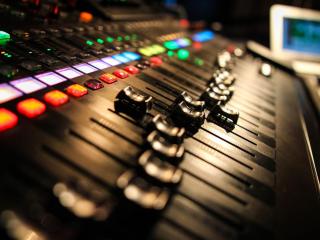
The process of mastering a song is becoming rapidly abused as home studios and YouTube musicians become more popular. Sometimes they create something that sounds great on computer speakers, but if it ever gets played through a home stereo, you might notice that it doesn't sound as polished.
Industry professional, Glenn Meadows of Masterphonics in Nashville says, "Mastering is the link between the pro audio industry and the hi-fi industry." The idea behind this is to take something that sounds good on professional grade studio monitors, and make it sound equally as good on a home system.
Especially with the changing trends in the music industry, having your songs and album mastered can be the difference in getting noticed instead of getting brushed under the rug with other amateurs.
Let's take a look at the history or mastering and why it is a vital step to creating a perfectly polished album.
The History of Mastering
Before music was digitalized, recording, mixing, and mastering didn't need to be done separately - the music was cut directly into a wax disc and played by an acoustic horn. The discs were stampers, which were used to create 78 rpm discs.
After the Victrola faded into the background, vinyl records hit the scene. Engineers had to get more technical when cutting the master disk to make sure the loud peaks in music wouldn't cause the stylus to pop our of the groove when the record was playing. In order to detect and reduce those peaks, engineers began using dynamic processing tools like compressors and limiters. This was the earliest form of mastering.
When the RIAA curve was introduced, equalization became part of the mastering process. This allowed records to have narrower grooves, thus allowing a longer playing time. Having to find a balance between the pre-emphasis curve (which enhanced high frequency transient peaks) and the de-emphasized curve (which caused a boost in lower frequency energy that triggered the stylus to pop out of the groove) became the difficulty which audio engineers had to perfect.
Those who could apply those skills to guarantee a positive customer experience became highly coveted and prized. Notable engineers like Doug Sax and Bernie Grundman also began focusing on ways their skills could improve the listening experience, not just the practicality of their skills. An art form was created - to this day, mastering is a combination of practical and aesthetic processes. Every audio engineer has a certain method to their art, so when looking for a professional, make sure you love their style, too!
The Importance of Mastering
The goal of mastering is to mix the balance issues and enhance audio characteristics of your music - it's like putting the icing on the cake. This is the final step before your song or album goes to be distributed to consumers.
Audio engineers will make sure your music is converted to CD speeds, set track indexes, prepare for conversion to high-resolution audio files, and include all the metadata needed to make sure your music gets broadcasted correctly.
Mastering takes time and precision to ensure that your album is consistent and properly compressed so all the tracks sound the same when they are playing back-to-back on an album. Equalized levels need to be even on each track before they can be compressed into audio files, or they won't sound consistent.
Can you imagine having to adjust the volume every time a new song starts to play?
No, I can't either. That is why having your music professionally mastered is so important to the quality of your music. It is better for the listener's experience, which is who you want to impress!
Reasons a Professional Will Help
There's a lot that goes into mastering an album. That's why it's best to leave it to the professionals! They are trained using top-notch equipment and know how to make your album sound perfect. It's their job to know all about genres of music and the rises and falls in the music industry.
Let's look at a few of the main reasons it's wise to invest in a professional audio engineer:
1. They're a fresh set of ears
Even people that aren't in the entertainment industry know that sometimes all you need is a second opinion. This would be the best time to have an objective opinion.
Chances are you've spent hundreds of hours working on your recordings and you know every single imperfection of your mixes. Having a fresh pair of ears listen to your music will ensure you get a positive reaction from your consumers. Engineers know how to create high-quality albums because they aren't too close to the project - being objective allows them to tweak mixing effects, balance equalization, and compress your songs in order to create a polished product.
2. Engineers know how your music will sound in other environments
Part of an audio engineer's job is to be familiar with all types of stereos and speakers that will be playing your music. And part of their job is to adjust your recordings so it sounds exactly the same regardless of whether you're playing it through a computer or surround sound speakers.
Professional studios have monitoring systems that are specifically designed for mastering music that will make sure it sounds good across all platforms of playback. The technology is advanced and professionals know exactly how it works.
Just mixing your music makes you very keep to how it sounds in your specific environment. Taking your music out of that studio and letting someone else make tweaks in a different environment means your album will have more versatility - again, just making the listener's experience that much better.
3. Professional mastering makes good mixes amazing
Just making your music sound better should be enough to convince you that investing in a professional engineer is the best thing you can do for your music.
Professionals are trained to listen for flaws in your music that a mixer may not recognize. They are also trained to fix those flaws without creating more problems. When one aspect of your music has to be adjusted, other aspects have to compensate as well for a clean, equalized playback. Audio engineers know all the ins and outs of fixing problems without making a bigger mess.
The most successful music is always sent to a professional mastering facility - for the room, the experience, the ears, the gear... everything you need to make a good mix sound amazing.
If you aren't sure where to start when looking for a professional to master your album, start by talking to the professionals at Sheffield. Highly trained and qualified audio engineers are able to make sense of your mixes before they get sent off to production and distribution. Contact them today to talk to real industry professionals about turning your music into a big hit!



